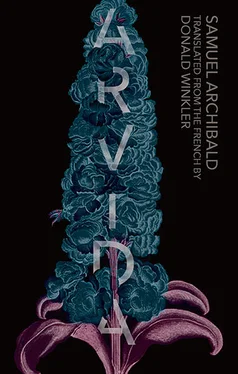The widow applied a humid kiss to the brow half torn from the dead man, and wiped from the corners of her eyes tears that were not there, and left the embalming room and the funeral home and slept at her parents’ and took the bus to Montreal where she arrived with the smell of cadavers still stuck in her nostrils and on her palate. She knew that smell. She’d smelled it often when she’d helped her great-uncle to dig graves in the village cemetery. Sometimes he dug a grave to bury a woman on top of her husband, and he was afraid at each blow of the shovel of breaking through the coffin’s rotten wood. The earth around them reeked of decomposition and at night she brought back to the house an odour of death that her sisters came to sniff, clotted in her hair, and that only disappeared after long, scalding baths.
Later she worked in restaurant kitchens and brought home with her odours of raw meat and cooking with spices and garlic, which never really disappeared, but at least they were the odours of life, and Paul said, laughing, that he felt like he was making love to a braised lamb. He was working at the university library. She would have liked to smell on his skin the fresh aroma of books they bought at bookstores or the rank odour of the books they unearthed in second-hand stores, but books don’t leave the same traces on people, and she never found any scent on him of paper, old or new.
It was Paul who came to drive her to the airport on Thursday.
They stayed in the car, watching the drops of rain slip like snails down the windshield. At a certain point she asked:
“What’s going to happen with us?”
Paul held her hand for a long time, staring ahead of him. She knew he wouldn’t kiss her.
“We’ll talk about it when you get back.”
“Maybe I won’t come back.”
He pretended to look for something in his jacket pockets.
“Come. We’ll unload your suitcases.”
The widow drank three Perriers on the plane, thinking about her ragged twenties. For years she’d stalked, unthinking, the lights over the doors of bars that invited you in like little birds befogged by mountain ash berries, who throw themselves against their own reflections in the windows. After, there’d been Paul, and all those years she’d loved him to the point of nausea, of not being able to sleep at night. She worked at the time in a rather tough neighbourhood. Getting off at two in the morning, she’d call Paul from the bistro so he’d come to meet her. They’d spot each other from a distance in winter in the middle of snowstorms, and for some hundreds of metres they’d appear and disappear from each other’s sight in great clouds of drifting snow that they themselves stirred up. They kissed and went home and rid their bones of cold by rubbing numb limbs together, while their bodies embraced the warmth and the skin of the other. You had to be very poor and desperate to love each other like that, and there was some comfort in knowing she’d never go back there. She had no trouble now paying her bills, and the great adolescent ache had dulled within her. She was safe now forever from turmoil, but was paying the price.
There is no true love for those who take cover from the storm.
Through the airplane window she observed the clouds, which didn’t look at all the same on high as they did from down below. From underneath they were all curves, and formed sheep or hills or faces. But from aloft they were broken lines, and formed arches and streets and facades and for a moment she thought to herself that things would have been different with Paul if they’d been able to live in one of those cities in the clouds. Soon Ireland’s pasturelands appeared in the window, and as far as Orly she watched Europe unfold as a life-size map, and thought no more of anything.
In Paris, jet-lagged, she took possession of the apartment she’d rented for the week. It was two rooms, furnished with a kitchenette, bathroom, and flowered balcony, on an upper floor of an Eleventh Arrondissement high-rise. In the afternoon she went up Avenue Philippe-Auguste and the Boulevard de Ménilmontant to Père Lachaise. She bestowed a sloppy kiss on Oscar Wilde’s monument, paused for a long time before Édith Piaf’s, and meditated over the remains, minus his heart, of Frédéric Chopin. The next day she visited Notre-Dame and saw two lovers light a candle, wondering what they might be pledging to each other. She then walked along the Seine, crossed Pont Royal, and stopped at the Musée d’Orsay, where she lingered over the Déjeuner sur l’herbe to examine the curves of this young woman who Paul had often claimed looked a lot like her.
She ate alone and went back to the apartment, heavy-hearted. She felt like crying, and had trouble breathing. She’d suffocated as a young girl in her village, she’d suffocated as a young woman in Montreal, and she suffocated now as a merry widow in the world’s capital. She went to bed with the growing unease that sometimes stopped her from leaving the house in the morning, and even from dragging herself out from beneath the bedclothes.
She was awakened at dawn by thunder. When she got out of bed, she saw through the window that the city was wrapped in fog and covered by an opaque layer of grey clouds. Later on, sirens wailed in the midst of the storm to signal that it was noon. The sirens dated from the war, and could have been those heralding an invasion. The rain pounded down on the city like shrapnel, and the widow watched it falling all day long from the balcony.
She saw the Eiffel Tower’s steel structure dissolve into an anthracite silhouette, then vanish completely. She saw the rain swallow up the Panthéon, the Montparnasse tower, and Notre-Dame. She saw the Butte Montmartre and Sacré-Coeur being washed away like dead trees in a rushing river.
She thought: terrible dreams are coming true.
The Romans and the barbarians wanted to destroy Paris, the English toyed with the idea for a hundred years, and Hitler wished for it with all his dark soul, not suspecting that the man responsible for razing the city would show himself more loyal to the splendours of Lutetia than to all the swastikas in Berlin.
For millennia, they had failed.
For two hours the widow hovered between sky and earth and watched the rain wipe away Paris.
The next day she got up, took a shower, and went down to the tobacconist to buy blonde Gitanes and a café crème . It was hot. Nothing remained of the storm, other than the heavy humidity being exhaled by the paving stones. She went back home to change and met an old man in the elevator who lived on the same floor. They greeted each other. He was a polite gentleman who wore a thick corduroy jacket and large, tortoiseshell glasses. He ought to have had a pile of books under his arm, but he was carrying records, old 33 r.p.m. jazz recordings. Dexter Gordon, Miles Davis, Sonny Rollins.
“Are you renting the Becqueret apartment?”
“No,” she replied, “I live here.”
“Really? You’re moving in?”
She smiled.
“I’ve always lived here.”
The old man looked at her, perplexed, then he smiled in turn.
“It’s true, you’re right.”
The elevator door opened. The old man added:
“And if you’ll allow me, Mademoiselle: in all this time, you’ve always been right.”
Returning home after an aperitif with friends a few days later, the widow came across a writer, much prized by the media, sitting at a table with a young woman, in front of a half-empty plate. She stared at him through the glass as if she were looking at a screen, not realizing what she was doing, until he lifted his head and gazed back at her with annoyance.
She gave a start, burst out laughing, and strode off. That was the most enduring impression the city left on her. Paris was a large zoo where intellectuals were shut up behind café windows.
Читать дальше












